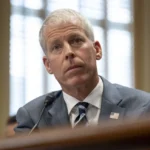BREAKING: Abortion Outlawed in Wyoming as Gov. Gordon Enables New Restrictions to Take Effect
Wyoming becomes the first state in the country to criminalize medical abortions, attempt to circumvent a court challenge to its abortion ban
- Published In: Politics
- Last Updated: Mar 16, 2023
By Jacob Gardenswartz with C.J. Baker
Special to the Wyoming Truth
Wyoming has become the latest U.S. state to outlaw abortions, as Gov. Mark Gordon on Friday signed one measure banning medications used to terminate pregnancies, and enabled another measure criminalizing most abortions in the state to take effect without his signature.
By signing Senate File 109 into law, Wyoming is the first state in the nation to explicitly ban medications that terminate pregnancy, the most prevalent abortion method today. Beginning in July, the prescription, sale or distribution of medications used “for the purpose of procuring or performing an abortion on any person” will be criminalized.
Effective immediately, House Bill 152, the “Life is a Human Rights Act,” attempts to circumvent the legal challenges which temporarily halted last year’s abortion ban by formally defining abortion procedure as “not health care.” Plaintiffs seeking to strike down that law had argued, thus far successfully, that a clause in the Wyoming Constitution guaranteeing residents the right to make their own health care decisions enabled them the opportunity to receive abortions if desired.

In a letter to Wyoming Secretary of State Chuck Gray, Gordon said he understands the intent of the legislation but is concerned that, “in practice, this bill would instead complicate and delay the resolution of these central and foundational constitutional questions.”
“I believe now more than ever that if the Legislature seeks final resolution on this important issue, it ultimately may have to come through a Constitutional amendment,” Gordon wrote. Though he had the ability to veto the measure outright, Gordon opted instead to allow it to take effect without his signature.
New measures spur lawsuits, outrage
HB152 repeals and replaces last year’s abortion ban legislation, making performing a pregnancy termination a felony crime punishable by a fine of up to $20,000 or up to five year’s imprisonment. Medical professionals who are found to have violated the law would have their license to practice in the state revoked, though the law clarifies that there would be no punishments for women “upon whom any abortion is performed.”
Though the bill’s top sponsor, State Rep. Rachel Rodriguez-Williams (R-Cody), had initially pushed to ban all abortions without exceptions, lawmakers in the Senate ultimately reinstated carveouts for instances of rape or incest, as well as situations where the life of the mother or fetus was in danger. Rodriguez-Williams, a fierce abortion opponent, said in a March 10 legislative forum that the measure was the “meat and potatoes” of her efforts to outlaw abortion, as it has “the definitions and so forth that we need” to do so legally.
But despite HB152’s intention to sidestep ongoing legal proceedings over abortion bans, the measure has already garnered a lawsuit of its own. The same coalition of state residents and reproductive health providers who filed last year’s lawsuit have already taken action aiming to strike down the new law.

In a complaint filed Friday in Teton County District Court and obtained by the Wyoming Truth, the plaintiffs argue the new ban will cause “irreparable harm” to those seeking reproductive care, and calls on the judge to institute a temporary restraining order halting the law from taking effect as soon as possible.
“In the absence of legal elective abortion in Wyoming, all women in the state who want an abortion or who seek health care related to abortion services will face a government-mandated trilemma,” the lawyers write. “[C]carry a pregnancy to term against their will; remain pregnant until they have the resources (if possible) to travel out of state to access critical, time-sensitive abortion health care; or attempt to self-manage their abortions outside the medical system and without the assistance of health care providers.”
Reached by email, John Robinson, an attorney representing the plaintiffs, told the Wyoming Truth that “our only comment is what is contained in our papers.”
Though no lawsuits have been filed yet against SF109, the measure criminalizing abortion medications, abortion rights advocates have reacted with similar anger. Antonio Serrano, advocacy director for the ACLU of Wyoming, promised in a Friday evening statement to “continue to challenge efforts contrary to our right to make our own reproductive health care decisions.”
Julie Burkhart, founder of the Casper abortion clinic Wellspring Health Access and one of the parties challenging the abortion bans in court, said the abortion measures “pose a direct threat to the health and lives of Wyomingites.”
Even Vice President Kamala Harris weighed in, writing on Saturday that the “‘So-called’ leaders in Wyoming passed extreme legislation to ban abortion.”
“This is another attack on safe and effective medication that the FDA approved 20 years ago,” Harris added. “It will put women’s health and lives at risk.”
Medical abortions in limbo nationally
Wyoming’s medical abortion ban comes as a preliminary ruling is expected imminently on a similar case with national implications. Judge Matthew Kacsmaryk of the Northern District of Texas will soon decide whether the Food and Drug Administration’s decades-old approval of the abortion drug mifepristone, one of two medications frequently used to terminate pregnancies, was appropriate.
In recent arguments on the matter, Kacsmaryk seemed open to the argument made by conservative legal group Alliance Defending Freedom, representing several anti-abortion medical organizations, that the FDA approved an “unsafe drug regimen” without proper study. Last month, Wyoming Attorney General Bridget Hill signed onto an amicus curiae brief with 21 other Republican state attorneys general, arguing the FDA’s decision on the drug was “deeply flawed.”
Used in combination with misoprostol to terminate pregnancies up to 10 weeks, peer-reviewed studies have found the two medications work successfully about 99.6% of the time, with a 0.4% risk of major complications.
In Wyoming, lawmakers initially proposed naming both mifepristone and misoprostol in their legislation banning chemical abortions, but ultimately opted not to name any specific drug in favor of broader language banning medications based on their purpose. Lawmakers favoring the ban worried drug companies could get around the legislation by changing the name of their products, while doctors and medical professionals testified that many of the drugs set to be outlawed were used for procedures other than abortion.
“We use them for inductions of labor, we use them for postpartum hemorrhage to save people from getting transfusions or surgeries,” testified Dr. Rene Hinkel, an OB/GYN in Cheyenne.













